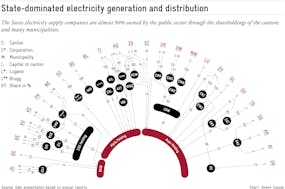After tough talks and as a last-minute Christmas present, the UK and the EU reached a deal: the almost 1250 pages long agreement now governs relations between the two.
Switzerland and the EU, meanwhile, are not seeking a new solution, but want to develop their existing bilateral agreements. But while that might sound relatively simple the two sides have been struggling to find a solution for over six years.
As expected, the UK-EU deal has been met with immense interest by the Swiss. Swiss Eurosceptics are jubilant about London’s success in striking a beneficial arrangement and calling for Bern to take up immediate renegotiation with the EU. But what has the UK really achieved, and where does Switzerland stand?
No equivalence of Swiss and UK pathways
A recently published list from the European Commission provides some insight. It uses several criteria to compare full EU membership with the agreement reached with London. In contrast to membership, the new deal offers only a few preferential rights. The table below shows the differences between the UK’s new relationship with the EU and Switzerland’s situation.
Including Schengen |
|||
| Free Movement of People and Schengen | |||
| Removal of border checks | |||
| Pet passports | |||
| Visa-free travel (90 days in a 180-day period) | |||
| Visa-free travel (beyond 90 days) | |||
| Right to work, study, live in another EU country | |||
| Removal of roaming charges | |||
| Trade in Goods | |||
| Frictionless trade | |||
| Zero tariffs or quotas | |||
| Zero customs formalities | |||
| Zero SPS checks | |||
| Zero rules of origin procedures | |||
| Fisheries agreement | |||
| Benefit from the EU’s international agreements | |||
| Trade in Services | |||
| Provision of services during 90 days | |||
| Financial services passport | |||
| Easy recognition of professional qualifications | |||
| Air Transport | |||
| Single aviation area, full freedoms | |||
| Bilateral 5th freedoms for extra-EU air cargo | |||
| Road Transport | |||
| Single internal transport market for hauliers | |||
| Cross-trade operations | |||
| Energy | |||
| Single internal energy market | |||
| Energy trading platforms | |||
| EU Programmes | |||
| Access to Erasmus | |||
| Access to NextGenerationEU, SURE | |||
| Galileo encrypted military signal | |||
| Access to Horizon Europe | |||
| Legende ✓ EU member or same rights as an EU member ᴏ Special conditions x No special conditions na Not applicable * Could be negotiated as a follow-up to the framework agreement ** At risk in the short and medium term without a framework agreement | |||
| Source: Own calculation based on European Comission (2020) | |||
|---|---|---|---|
Obviously, the UK-EU accord cannot be compared to Switzerland’s over 120 agreements with the EU. That would be like contrasting an English Blue Stilton with a Swiss Gruyère – both are cheeses, but incomparable in taste.
Back in 2017, EU negotiator Michel Barnier anticipated such differences by comparing the various existing models of cooperation with the EU.
The three EEA member states Norway, Iceland and Liechtenstein stand closest to the EU, with Switzerland following on the next step (see figure). By contrast, the agreement with the UK most resembles one of the EU’s free trade agreements – such as those with South Korea or Canada.

Source: Barnier (2017)
Models of market access and cooperation with the EU
Switzerland’s bilateral EU agreements represent much more than partial market access deals and are tailor-made models of cooperation with the countries of greatest economic importance to Bern by geographical and cultural proximity. Stopping further development of this bilateral route – after all, a legal area like the single market continues to evolve – would erode the value of the package for both sides. Post Brexit, the UK faces similar challenges; its deal with Brussels does not close the book: selective adjustments or even extensions will have to be discussed in future, unless the two sides revert to a creeping regression to WTO trade principles.
A free trade agreement would be a step back
Swiss critics of the framework agreement with the EU are now pushing to extend the bilateral free trade agreement of 1973, following the UK model. That would represent a total change and would mean abandoning the bilateral path that has been successful so far and confirmed by about a dozen Swiss plebiscites. Even a comprehensive free trade agreement with Brussels would be a clear step backwards from the bilaterals, as already stated in a Federal Council report in 2015.
In this light, it is all the more fatal that the Federal Council has hardly dared to show its colors since. Instead, the government has refrained from pursuing further bilateralism with any conviction. That restraint has allowed Swiss Eurosceptics to shape public perceptions. The media already talks of a “dead agreement” without further comment, while opportunities – such as greater legal certainty or the conclusion of new sectoral market access deals – are underplayed. But time is pressing, and particularly Switzerland’s electricity grid is threatened with collapse in the medium term without an arrangement with the EU.
Time for Action
Abandoning the framework agreement would not guarantee preservation of the status quo. The high value-added Swiss medical technology industry, for example, would be first to feel the impact. Exports to the EU would become more cumbersome, hitting the industry’s competitiveness. Investments in the EU market would be more attractive, potentially at the expense of Swiss jobs. Bern must get moving now. Negotiations have gone on for far too long and companies in Switzerland have been waiting for answers about future relations with their most important export market.





